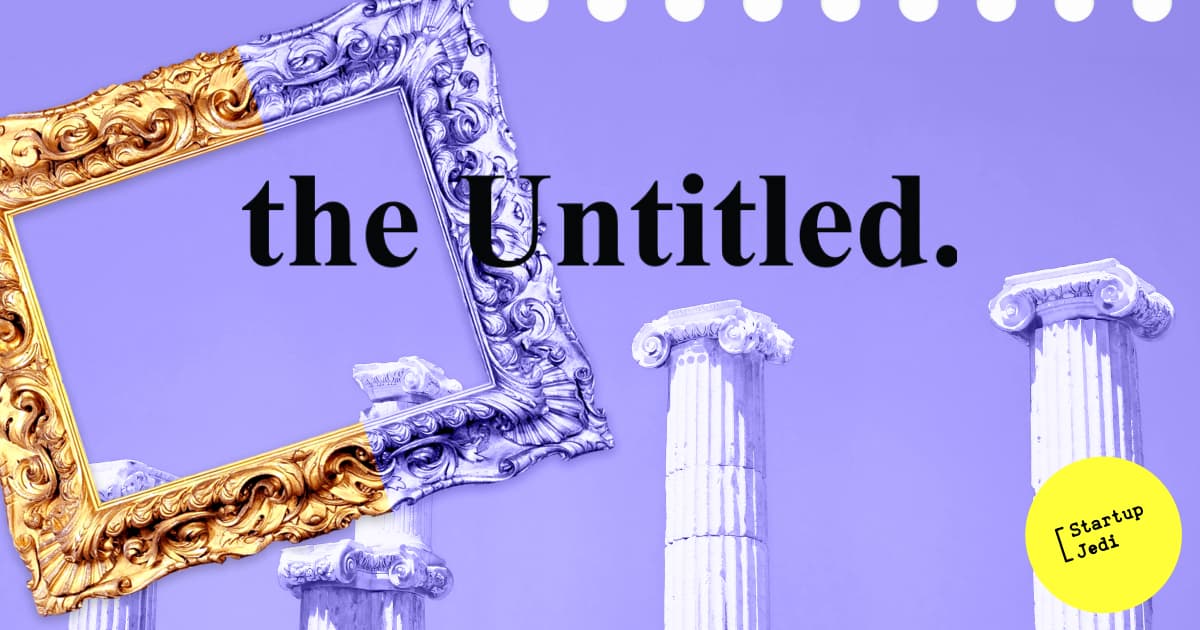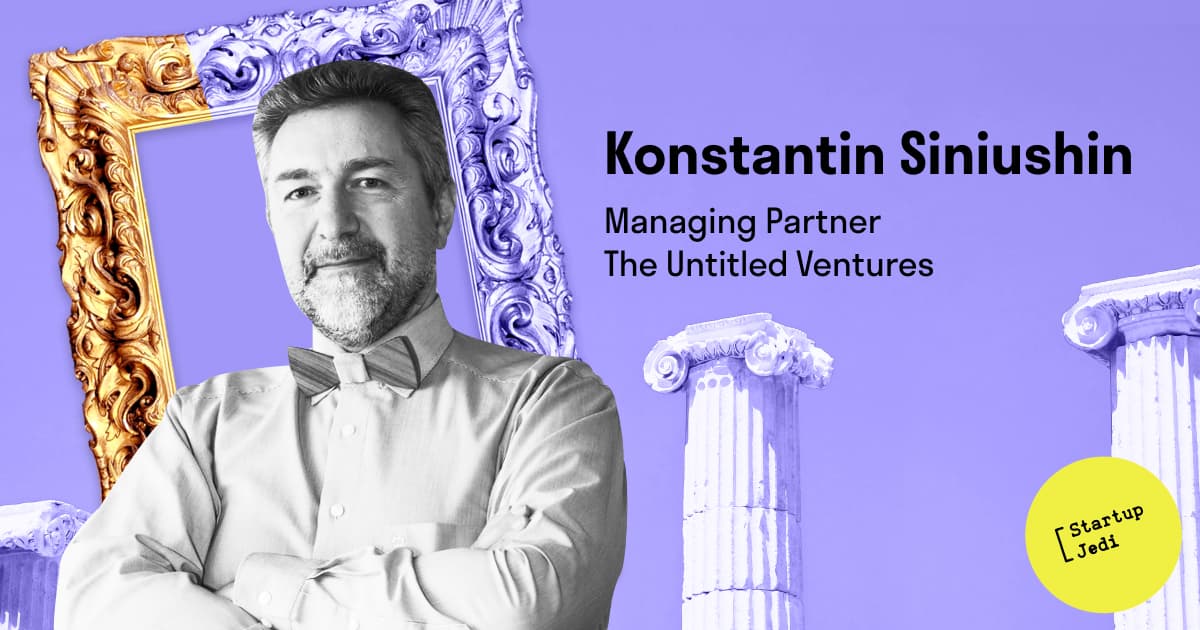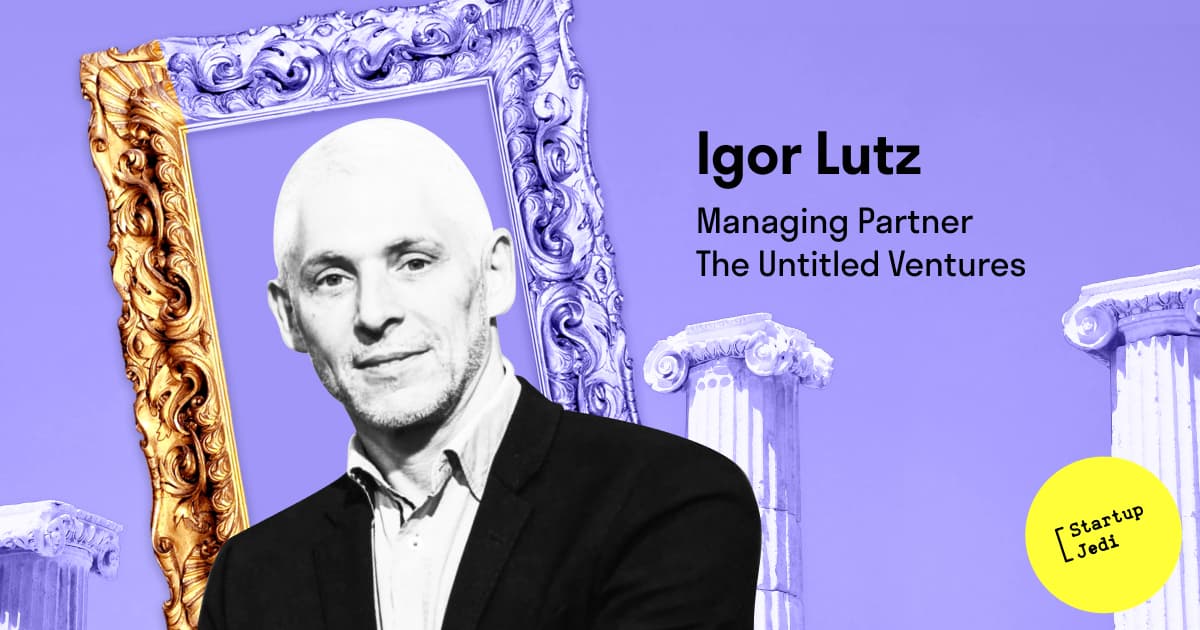
Startup Jedi
We talk to startups and investors, you get the value.
You can understand the fund’s philosophy from its name: The Untitled Ventures prioritizes the achievements of its projects. Perhaps this helped them become one of the key players in the market and bring together two dozen startups, whose products impress even those inexperienced in new technologies. Managing Partner of The Untitled Ventures Konstantin Siniushin told Startup Jedi what the fund initially focused on and what factors shifted this focus. He also shared what is happening on the Russian venture capital market, why the fund does not have to compete for startups and how they select portfolio projects.

Startup Jedi
We talk to startups and investors, you get the value.
The Untitled Ventures is an early stage venture capital fund that invests in breakthrough technologies from Eastern Europe. It’s one of the market leaders in its segment with over 20 projects in the fund’s portfolio. These are startups in artificial intelligence, machine learning, computer vision, blockchain, unmanned aerial vehicles, fashion industry and marketing. 6 exits were made over the life of the fund. On average, the fund invests from 100,000 to 300,000 euro in a project .
...
— Tell us how the fund has developed: what was it like when you were recruiting the first companies into the portfolio, and what is like it now?
— The fund has clearly changed a lot over the past six years following the dramatic economic and geopolitical changes in Russia.
We initially planned it as a seed fund for promising innovative projects that, being inside the growing Russian economy, will be able to raise foreign funding at the next stages. But we faced economic stagnation, a currency crisis, and the country’s self-isolation rather quickly.
We chose to invest in projects at the intersection of retail, advertising and media that back then was still an original idea since these were the largest internal competitive markets in the country. Besides, and at that time they were not regulated by the state too much.
As a result, our first portfolio projects were not very successful in terms of growth rates, since they failed to raise foreign financing, and Russia did not have enough funds for rapid growth.
However, our first portfolio is good because it managed to survive and continues to develop, attracting additional resources. We hope that by the time the fund stops working, we will be able to make exits that are the industry average.
We already closed all new investments or the first fund in 2020, except for supporting the next several rounds in the most promising projects. The first fund’s lifespan is 10 years, 6 out of which have passed already so we are now actively starting the exit stage. This year we want to make 3 more exits with good multiples.
All this taught us not to invest in the domestic market. As a result, we tried to choose more and more later startups among projects that were suitable for export straight away, since the volume of the world market is hundreds of times larger and, at the same time, it’s much easier to get foreign financing at the next stages.
The main thing that these funds need to prove is the technological uniqueness of the project and its ability to sell on the world market. And here we have much more impressive indicators on the growth of portfolio valuation and one brilliant exit 33X. It was the exit from Voximplant. At the next round, our share was bought by Baring Capital and the syndicate of investors it collected. Voximplant is one of the world leaders in the integration of audio and video into various communication channels with corporate clients.
We hope to show even better results soon. In this segment, we were no longer locked into some industry, but relied on ready-made unique technologies created by Russian founders that could be easily commercialized abroad, including with our help.
...

— How did you choose the focus of the fund?
— Igor Lutz and I, having pooled our capital into the first seed fund, got a combination of rather unique competencies. I have experience as a serial IT entrepreneur, having grown three companies for sale for strategic buyers from public multinationals with the help of various partners and with varying degrees of success. And Igor was one of the leaders and co-owners of the Russian branch of the global advertising corporation BBDO, he has a unique strategic vision and understanding of corporate sales. Our technological and strategic experience has always given us an understanding of where and how to invest correctly in Russia, and we’d like to believe this applies to the international market as well.
Now we have a significantly broader range of first portfolio projects that include artificial intelligence, computer vision, unmanned aerial vehicles, communication technologies, fashion industry and dating — all this allows, together with earlier projects, to have a well-balanced portfolio in unique areas that have passed the Gartner hype cycle peak, but continue to grow steadily.
However, experience with slow growth in the early stages has taught us that we need to invest in the later stages and with a big check. As a result, our new fund, which we are collecting now, will invest with an average check of 1.5 million instead of the previous 150 thousand euros.

— What industries have been gaining ground for investors in the last year and a half?
— Each investor sees the prospects in their own way, but we no longer associate our focus with any specific market; rather, we have discovered some other original signs of future success. For example, it is very important for us that the team has already tested all hypotheses successfully in the domestic market, has understood the relevance of its Russian experience to world demand, is ready to enter the international market even at the cost of losing prospects in its home market, and has its own technologies that are truly unique on a global scale.
The industry focus is no longer important for us nor is the target foreign market. However, from the point of view of transferring business to a foreign jurisdiction, for many reasons we are impressed by Europe and Great Britain. This is partly due to the possibility of transporting the project there as it is physically the simplest and cheapest option, as well as the significant grants for developing technologies. Besides, in some countries, such as Latvia, the government has created unique tax incentives for transported startups.
...

— Has the COVID-19 pandemic affected your work and if so, how?
— The pandemic has had a serious impact on our portfolio. Some projects with a large offline component slowed down sharply, others operating online got a boost. On average for the portfolio, we seem to be at zero sum now, but in the future we plan to drastically reduce investments in offline technologies.
On the other hand, the pandemic has created many new niches. Let’s take, for example, the use of drones for the emergency delivery of drugs and vaccines in hard-to-reach areas. Today this is a pilot project of our portfolio startup FIXAR in the mountains in Northern Canada.
...

— Russia has a well-developed startup ecosystem. How would you rate the competition in your segment? Do you have to “fight” for a project you like?
— We have an original focus and assessment system so we have almost never encountered anything like this before, and today the seed investment market is actually a buyer’s market, not seller’s. This is partly positive, since the problem of many theoretically successful startups was that they had been previously overestimated, which did not ultimately make it possible for the first investor who accepted such conditions to earn money and scared off new potential investors.
Yet, we need to admit that today many startups cave in to the blackmail of non-professional investors and agree to take money from them although the value of their startup is underestimated. This will also scare off new investors, but for a different reason: the underestimated share of the founders that remains in the end.
— How has venture capital changed in recent years / 2020?
— If we are talking about Russia, then it is in deep stagnation and state support is of little help without the resumption of economic growth in the country.
After all, private money serves startups well only when their revenue is steadily growing. State attempts to stimulate the investment process with budget money cannot fundamentally change anything, because these are non-competitive investments in a situation where there is no economic growth. And private investors prefer to invest abroad, where the world market demand is almost unlimited
— Who is facing a bigger challenge now: investors, because the risks have grown, or startups, because it is not easy to raise investment?
— Both are struggling in Russia now. Basically everyone who makes projects or invests in them does, and so do all the industries affected by the pandemic.
...

— What do you pay attention to? Is it company (founders, skills, team spirit), industry or model
— Several metrics are important for us, which we do not add together, but multiply when making an investment decision. In other words, if there is a zero for some group of criteria, then positive marks for all the rest no longer matter. This is a tough decision that we came to based on our past experiences. Too often, if the project is lacking behind on one axis, good results on others fail to make up for this.
— What do your portfolio companies get besides money?
— Unique people they can talk to. In fact, this is the most important thing — when you can come to consult an investor simply as an older and more experienced person in business, who has already solved similar problems many times in the past. We do not give any advice, we just help the team not to get scared and find the methodologically correct solution themselves. Otherwise, it will no longer be a startup of founders, but a startup of investors. Our mission is to help founders make informed decisions that they find in the course of a conversation with us.
— Does it ever happen that portfolio startups drastically change product positioning after investment? How does that turn out?
— It often happens when entering foreign markets that you realise everything is arranged a little differently than in the home market even in a similar industry where your project already succeeded. In general, this setting allows the team to adapt: you should not panic because of such a gap in different markets.
...
— How and where are you looking for projects in which you could invest in the future?
— You may be surprised, but half of the projects come from the recommendations of our network, and we find the other half ourselves by the trace teams leave in the information field. But we mainly get irrelevant projects on our email and we do not understand why.
— How long does it take to communicate with the team?
— Basically, we monitor the dynamics of the development of relations for three months, but sometimes this takes longer due to new events that are important for project development, which usually happen externally, but sometimes also within the team.
— What aspects do you pay attention to when deciding on investments?
— Proven technology, proven business model, proven team entrepreneurship and willingness to conquer the world.
— How is work with a startup organized after investment?
— We enter the project board of directors and that’s the only tool we use to influence the company.
— How do companies report?
— We usually hold meetings of the board of directors once a quarter, sometimes more often when the rapid dynamics of the project’s development requires to do so or in case it’s more convenient for the team.
— What advice do you have for startups looking for investors now?
— I think they should only search for investors with relevant investment focus.
Facebook: facebook.com/StartupJedi/
Telegram: t.me/Startup_Jedi
Twitter: twitter.com/startup_jedi
Comments